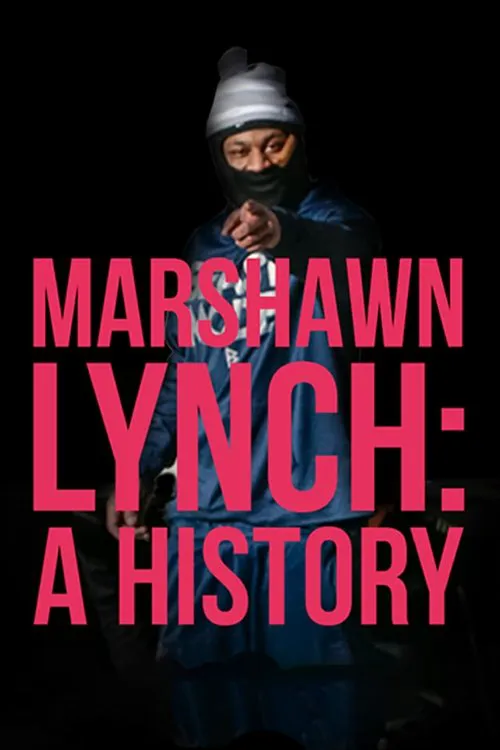Lynch: A History

Plot
In 'Lynch: A History,' director Tommy Oliver embarks on an unparalleled journey to dissect and deconstruct the life and career of Marshawn Lynch, a man who embodies a quintessential paradox. A professional football star with an unapologetic demeanor, Lynch stood at the nexus of a culture that simultaneously glorified individualism and conformity. As he navigated the NFL's most scrutinizing limelight, Lynch became an unwitting vessel for the societal tensions of his era – a perfect storm of racism, resistance, and rebellion. The film begins with a flurry of images, fragments of clips from news broadcasts, sports highlight reels, and Lynch's own interviews. We see the young running back bursting onto the scene, electrifying the field with his ferocious running style and his bold, unapologetic on-field personality. From the start, it's clear that Lynch's approach would rub many the wrong way – the media, coaches, opponents, and even some of his own teammates would grapple with, and often fail to understand, the enigmatic figure at the center of the Raiders' explosive offense. Throughout the first half of the film, we delve into Lynch's early life in Oakland, California, a city notorious for its racial divides and social unrest. Lynch, a product of this environment, would emerge as a fierce and unyielding presence, one that refused to be molded or shaped by the expectations of those around him. He became an icon for his peers and an antagonist for those who struggled to comprehend his perspective. As the years went by, the media and pundits would attempt to categorize Lynch, labeling him everything from "tough-minded" to "uncoachable." But as Oliver so deftly demonstrates, these characterizations only served as feeble attempts to contain the uncontainable force that was Marshawn Lynch. One of the most compelling aspects of 'Lynch: A History' is its nuanced exploration of the symbiotic relationship between media and oppression. As the film progresses, it becomes increasingly clear that the systems in place to shape and control our perceptions – sports, news, pop culture – are themselves entangled in the very fabric of systemic racism. Lynch, the defiant football star, becomes the unlikely catalyst for a scathing critique of these mechanisms, exposing the hypocrisy that lies at their core. Oliver's masterful editing and narrative design allow the film to unfold as a dynamic, multifaceted work, one that seamlessly transitions between Lynch's triumphs on the field, his impassioned public statements, and the more somber realities of life as a black man in America. We witness Lynch's protests, his Black Lives Matter activism, and his quiet support for community-building initiatives. Through these glimpses, 'Lynch: A History' masterfully conveys the complexity and nuance of his subject, refusing to reduce the man to a single, simplistic narrative. Perhaps the most powerful aspect of 'Lynch: A History' lies in its exploration of the consequences of speaking truth to power. Lynch's refusal to remain silent, his willingness to speak out against oppression, and his unwavering commitment to his own values have made him one of the most polarizing figures in modern sports. As the film illustrates, his actions have inspired both devotion and outrage. Some see him as a hero, a beacon of resistance and defiance; others view him as a provocateur, a man who disrupts the status quo with his words and deeds. Through Lynch's story, Oliver presents a searing indictment of our societal constructs, revealing the inherent contradictions and hypocrisies that plague our public discourse. As the film reaches its conclusion, we're left to ponder the implications of Lynch's stance, to grapple with the tensions between resistance and conformity, and to reflect on the true meaning of 'history.' What emerges from this provocative portrait is a profound, unsettling truth: the lives and experiences of individuals like Marshawn Lynch are inextricably linked to our collective story, reflecting our darkest moments and our most profound contradictions. 'Lynch: A History' is a visceral and thought-provoking film – a call to action, a provocation, and a testament to the transformative power of unapologetic individuality. By placing the media, its mechanisms, and its biases in the crosshairs, Oliver delivers a cinematic experience that is both deeply personal and universally relevant. In Marshawn Lynch, we see the embodiment of a complex, confounding figure, a person who embodies both the fury and the beauty of resistance. As we walk away from this powerful, enigmatic film, we're left with a haunting question: What will be the legacy of 'Lynch,' and what will we choose to remember from this complicated, captivating chapter in his history?
Reviews
Recommendations



